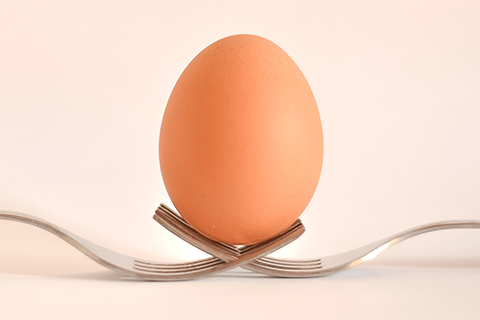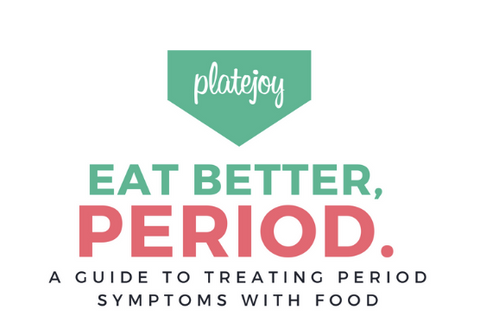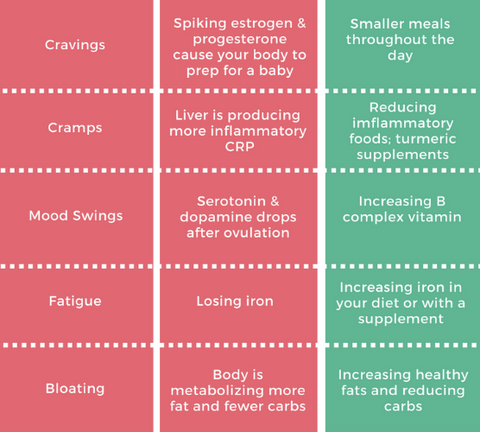Eat Better, Period. A Guide to Treating Period Symptoms with Food
thinx archive
·5 min read

by Christina Bognet | 10/19/2016
The first twinge of menstrual cramps, the overly emotional response to a friend’s comment, the number creeping up on the scale - ah, has it really been three weeks since you had to wake up multiple times in the middle of the night to change your pad? Probably!
Aside from the constant bleeding for days on end, periods may cause many other symptoms, negatively affect our mood (putting us in the worst possible position to deal with these changes) and induce cravings for foods that will make us feel worse, too. Even in the darkest days under our coziest comforter, we have more power than we think -- PMS induced suffering can be reduced naturally through food and supplements; all you need is a plan.
Meal planning can transform the week of your period from lying on the couch feeling miserable to having our best (and healthiest) week yet. While we can be quick to feasting on an all take-out diet, we've done some research on what foods can keep us feeling our best (but don't be afraid to throw in an egg roll or taco for good measure).
Let’s talk about what causes the most common period symptoms, how we unintentionally make them worse, and how we can treat them naturally, through what we eat.
Cravings ===============
If you can tell that your period’s on the way because it suddenly seems normal to eat an entire pizza, you’re not alone. Your hormones are telling you to load up on nutrients to feed your incoming baby; when estrogen and progesterone spike, it also triggers your hunger response, leading to super-sized cravings.
Some of those extra nutrients are used to fuel the menstruation process itself (your body burns 100 to 300 more calories a day when you have your period) but if you’re not planning on being pregnant every month, you can counter the cravings by consuming smaller meals throughout the day. A 2014 study shows that you’ll be reassuring your body that it’s getting the nutrients it needs and increasing your serotonin levels, which will help keep mood swings and fatigue at bay.
Menstrual cramps
What if you could quell cramps just by changing what you eat? A new 2016 study suggests it’s possible. It traced the pain to a protein called CRP (C-reactive protein), which the liver produces when there’s inflammation in your body. The more CRP, the more frequently people reported painful cramps.
So how do you reduce the inflammation? Curcuminoid containing compounds like turmeric have been shown to decrease levels of CRP. Because anti-inflammatory medications like Advil destroy the lining of our gut and can lead to long term problems - we recommend 1.5g of natural turmeric capsules instead.
Physicians like Dr. Andrew Weil recommend a Mediterranean-style diet, with a focus on fresh produce, vegetable protein like beans and legumes, nuts and seeds, seafood, and whole grains. Limit red meat, caffeine, cheese and sodium (especially in processed foods).
Mood Swings ==================
B complex (also known as vitamins B1, B2, B3, B5, B6, B7, B9, B12) have been linked to lots of great things: healthier hair and skin, more energy, and more focus. But maybe the best reason to up your vitamin B consumption? Several studies suggest it reduces your risk of PMS, especially in regulating your mood.
After ovulation, your levels of serotonin and dopamine can drop dramatically, causing all the bad vibes. The solution? Up your vitamin B intake by incorporating more leafy greens, dairy, seafood, whole grains and legumes (like lentils and beans). You can also supplement B Complex vitamins - here’s one we like.
Fatigue
This one seems easy enough to understand: When you’re bleeding, you’re losing iron. The solution? Eat more of it. Iron deficiency not only contributes to iron-deficiency anemia (and fatigue) but also likely contributes to other PMS symptoms, since it also helps produce serotonin (which you’re already moderating by eating regular, small meals and all that B complex, remember?).
A 2013 study that tracked the diets of 3,000 women over 10 years found that those with the most iron in their diets were 30% less likely to suffer from PMS. Up your intake by incorporating more leafy greens (hello, kale), legumes and lean meats.
Bloating & Weight Gain =============================
First the bad news: Hormones can mess with our weight, causing bloating and weight gain. But the good news is that we might be able to use our cycle to our advantage.
During the luteal phrase (aka right before your period starts), your body uses less carbohydrates and more fat. A new 2016 study paired women with a diet that took these metabolic changes into account, lowering carb intake and raising healthy fats to match their cycles. The result? Fewer cravings and less bloating.


Do you have a recipe or tip for period cravings? Share with us below!
(& Bonus!!! On PlateJoy, you can plan your optimal menu with shopping lists and personalized recipes with the click of a button - use the code THINX for $10 off!)
Christina Bognet is an MIT neuroscience grad with a passion for helping people live healthier, happier lives. She's the founder of PlateJoy.com, a personalized meal planning and (optional) grocery delivery service that saves you time and money every week, while helping you feel amazing. Click here for a free 10 day trial of PlateJoy.
by Christina Bognet


